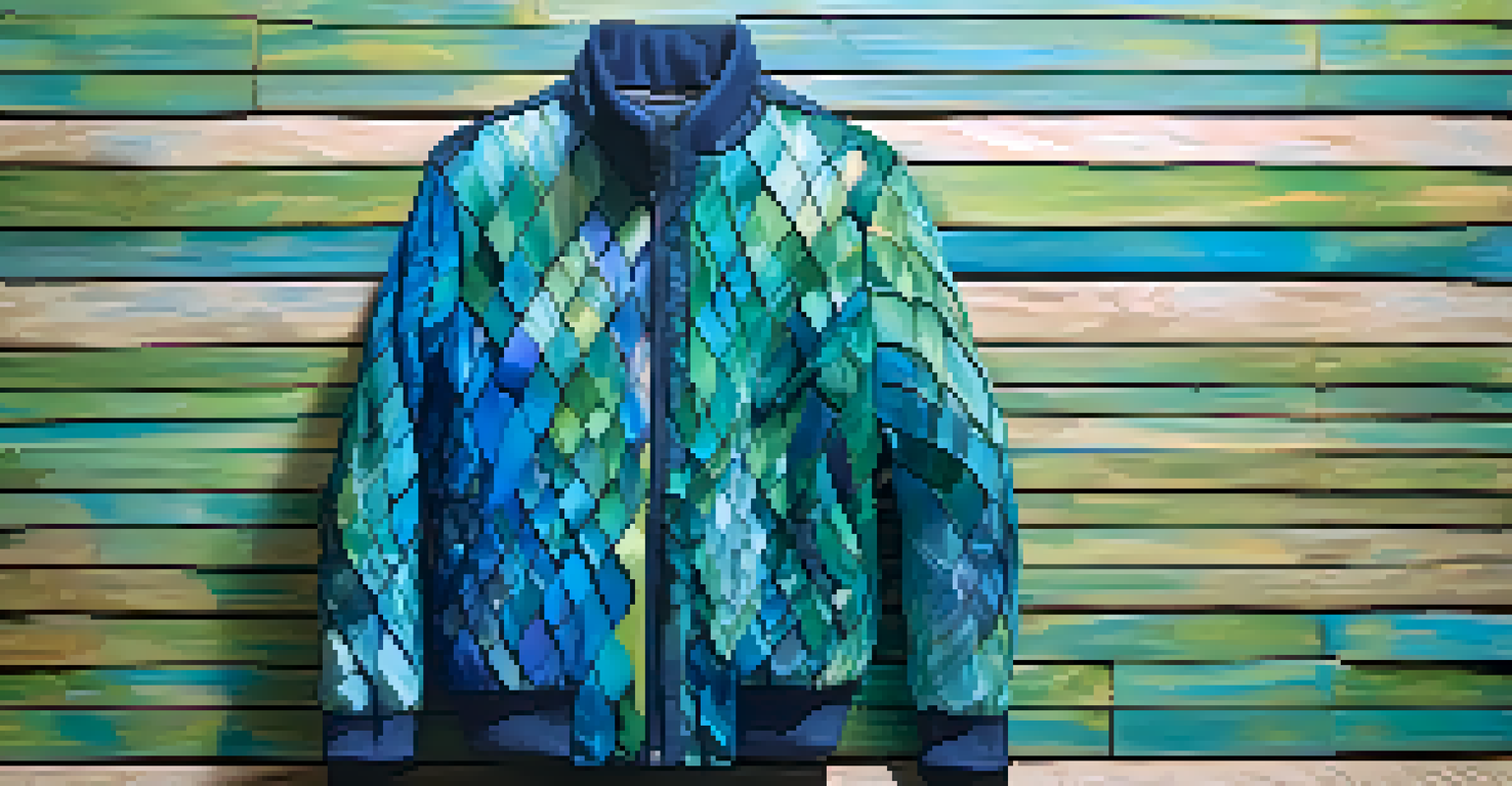Sustainable Fashion: Tech Startups Leading Eco-Friendly Trends

The Rise of Sustainable Fashion in Tech Startups
Sustainable fashion has emerged as a vital aspect of the modern apparel industry, and tech startups are at the forefront of this movement. With increasing awareness about environmental issues, these startups are leveraging technology to create eco-friendly products. From innovative fabrics to transparent supply chains, they are reshaping how we think about clothing and its impact on the planet.
Fashion is about dreaming and making other people dream. But when it’s done sustainably, it’s about making the world a better place.
One interesting example is the use of biodegradable materials, which some startups are incorporating into their designs. This helps reduce waste, as these materials break down naturally instead of contributing to landfill piles. By blending traditional craftsmanship with modern technology, these companies are not just selling clothes; they're promoting a lifestyle that values sustainability.
Moreover, these tech-driven initiatives are appealing to a younger audience, particularly millennials and Gen Z, who prioritize sustainability in their purchasing decisions. This shift is not only beneficial for the environment but also opens up new market opportunities for these startups, allowing them to thrive in an increasingly competitive landscape.
Innovative Materials: A Game Changer in Sustainable Fashion
One of the most exciting developments in sustainable fashion is the creation of innovative materials that are both eco-friendly and stylish. Startups are experimenting with fabrics made from recycled plastic bottles, organic cotton, and even mushroom leather. This not only reduces the reliance on traditional materials but also encourages a circular economy where waste is minimized.

For instance, some brands have developed jackets made from recycled ocean plastics, giving new life to materials that would otherwise pollute our oceans. This not only highlights the importance of recycling but also shows consumers that they can wear fashion that makes a positive impact. Such initiatives are transforming how materials are sourced and perceived in the industry.
Sustainable Fashion Gains Popularity
Tech startups are driving the shift towards sustainable fashion by creating eco-friendly products and appealing to environmentally conscious consumers.
Furthermore, these advancements in material science are paving the way for new design possibilities. With eco-friendly materials, designers can explore unique textures and aesthetics that appeal to environmentally conscious shoppers, proving that sustainable fashion can be both beautiful and responsible.
Tech Innovations Enhancing Sustainable Practices
Technology is playing a crucial role in promoting sustainability within the fashion industry. Startups are harnessing artificial intelligence, blockchain, and 3D printing to create more efficient production processes. This not only reduces waste but also enhances transparency in supply chains, allowing consumers to make informed choices.
Sustainability is no longer about doing less harm. It's about doing more good.
For example, blockchain technology enables brands to trace the origin of their materials, ensuring ethical sourcing and fair labor practices. This transparency builds trust with consumers, who are increasingly demanding accountability from the brands they support. Startups utilizing this technology are setting a new standard in the industry.
Additionally, 3D printing allows for on-demand production, which minimizes overproduction—a significant issue in fast fashion. By creating garments only when needed, these startups contribute to a more sustainable model that aligns with consumer demand while reducing environmental impact.
The Role of Consumer Education in Sustainable Fashion
As tech startups lead the charge in sustainable fashion, consumer education becomes paramount. Many shoppers are still unaware of the environmental impacts of their fashion choices. Startups are stepping up by providing informative content about sustainable practices, helping consumers understand the benefits of eco-friendly products.
Through social media campaigns, blogs, and newsletters, these companies are raising awareness about the importance of sustainability in fashion. They often share insights on how to care for garments to prolong their lifespan and reduce waste. This educational approach empowers consumers to make more conscious decisions when shopping.
Innovative Materials Transform Fashion
Startups are developing stylish materials from recycled and organic sources, promoting a circular economy and reducing waste.
Moreover, by highlighting the stories behind their products, startups create a connection between consumers and the items they purchase. When customers understand the positive environmental and social impacts of their choices, they are more likely to support brands that align with their values.
Circular Fashion: Renewing the Lifespan of Clothing
Circular fashion is an emerging concept that emphasizes reducing waste by reusing and recycling clothing. Tech startups are pioneering this movement by offering take-back programs that encourage consumers to return their used garments for recycling or refurbishing. This innovative approach not only minimizes waste but also fosters a culture of sustainability.
For instance, some brands have developed platforms that facilitate clothing swaps or rentals, allowing consumers to refresh their wardrobes without the environmental burden of fast fashion. By providing alternative ways to enjoy fashion, these startups are challenging traditional ownership models and promoting a more sustainable approach to clothing consumption.
In addition to reducing waste, circular fashion also emphasizes the importance of quality over quantity. By investing in high-quality, durable pieces, consumers contribute to a more sustainable future while enjoying longer-lasting garments that stand the test of time.
The Impact of Social Media on Sustainable Fashion Trends
Social media has become a powerful tool in the promotion of sustainable fashion, allowing tech startups to reach a wider audience. Platforms like Instagram and TikTok enable brands to showcase their eco-friendly practices and innovative products in engaging ways. This visibility helps to raise awareness and inspire consumers to embrace sustainable choices.
Influencers and content creators are also playing a significant role in this movement, often highlighting sustainable brands and sharing tips for eco-friendly living. Their authentic recommendations resonate with followers, driving interest and purchases in sustainable fashion. This organic promotion creates a community of like-minded individuals committed to making a difference.
Consumer Education is Crucial
Educating consumers about sustainable practices and product sourcing helps build trust and encourages conscious purchasing decisions.
As a result, trends in sustainable fashion are gaining momentum, creating a ripple effect throughout the industry. The more consumers engage with these ideas online, the more brands feel the pressure to adapt and innovate, leading to a collective shift toward sustainability.
Challenges Facing Sustainable Fashion Startups
Despite the promising advancements in sustainable fashion, tech startups face several challenges. One major hurdle is the higher cost of sustainable materials and production methods, which can make it difficult for these brands to compete with fast fashion giants. Balancing affordability with sustainability is an ongoing struggle for many startups.
Additionally, as the market for sustainable fashion grows, so does the risk of greenwashing—when companies falsely claim to be eco-friendly. This can create confusion for consumers, making it crucial for startups to maintain transparency and authenticity in their messaging. Building a trustworthy brand is essential for long-term success.

Finally, securing funding and resources for sustainable innovations can be challenging for startups. Investors may be hesitant to support businesses that prioritize sustainability over immediate profit. However, as consumer demand for eco-friendly options continues to rise, the potential for growth in this sector is becoming increasingly appealing to investors.